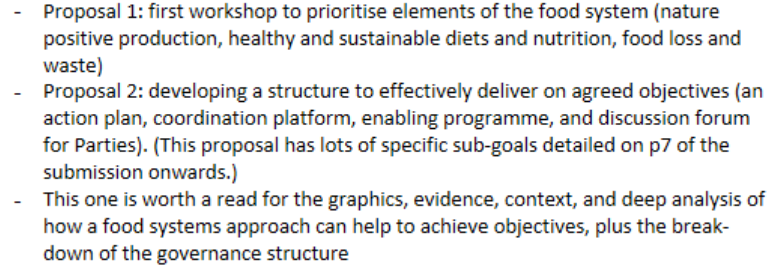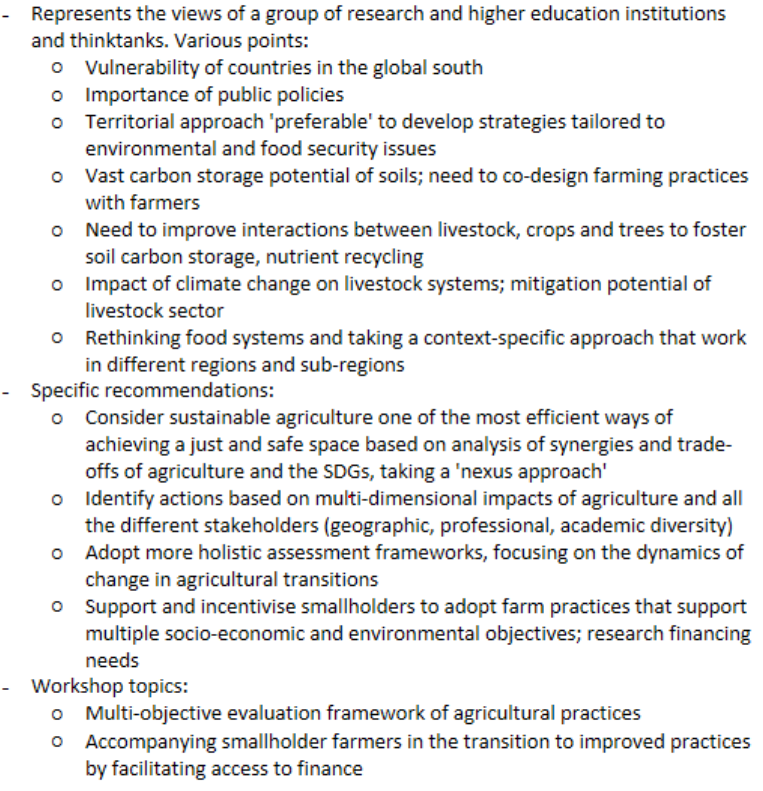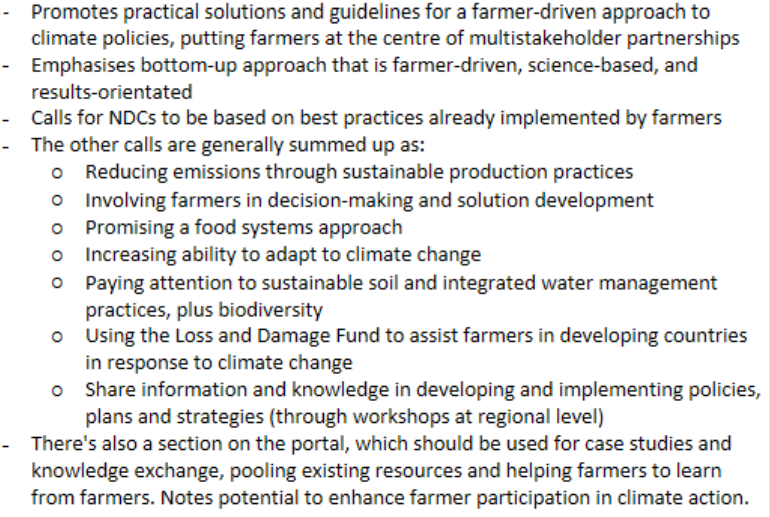Today is the deadline for submissions to the @UNFCCC process on agriculture and food security (formerly Koronivia, now abbreviated to the Sharm el-Sheikh Joint Work). I read all 17 submissions so far so that you don't have to🧵
For those unfamiliar with this process, this is our opportunity to influence the topics and discussions covered in meetings of parties under the UNFCCC process (including COPs), so it's kind of a big deal.
By the way, I know of at least 4-5 more still to come, including one from GAIN and partners on consumption and diets. The system isn't easy to navigate so it's coming down to the last minute. I'll update later on if of interest. But here's what we have so far:
@WWF starting things off in style with this submission on taking a food systems approach and making some very specific points about effective delivery on agreed objectives. This one is well worth a read in full.
www4.unfccc.int/sites/Submissi…
www4.unfccc.int/sites/Submissi…

@UNDP covers a wide range of topics. Interesting examples of the transitions they hope to see. 

@OECD builds on lots of its ongoing work, which is helpful. Some specific focus topics that align to its areas of focus, which could support future work. 

This is a bit of a different angle from @IDDRI_English, @TheIRD, @Cirad, and @INRAE_Intl - more focused on agricultural practices, and also a global-south lens.
www4.unfccc.int/sites/Submissi…
www4.unfccc.int/sites/Submissi…

@CAFOD, @CIDSE, @iamCARITAS and many other endorsers have four priorities for thematic workshops, and also mention strong governance of the joint work. It's a really strong and compelling submission (not that others aren't!).
www4.unfccc.int/sites/Submissi…
www4.unfccc.int/sites/Submissi…

The @worldfarmersorg and @theclimakers bring in the farmer perspective, and more.
www4.unfccc.int/sites/Submissi…
www4.unfccc.int/sites/Submissi…

...I just realised ChatGPT probably could've done all these summaries for me in about 8 seconds. Never mind. Onward!
@CANIntl has a very comprehensive submission with multiple suggested workshop topics.
www4.unfccc.int/sites/Submissi…
www4.unfccc.int/sites/Submissi…

Nice to see @Cornell represented, bringing in lots of links to research before some workshop recommendations.
www4.unfccc.int/sites/Submissi…
www4.unfccc.int/sites/Submissi…

@MoveTheWorld looks at a full food systems approach, bringing in lots of important points around animals, farmers, transitions, and workshop topics.
www4.unfccc.int/sites/Submissi…
www4.unfccc.int/sites/Submissi…

The @giz_gmbh submission is very impressive. Longer than others and most comprehensive. It has an urgent tone and takes a broad scope.
www4.unfccc.int/sites/Submissi…
www4.unfccc.int/sites/Submissi…

And finally on this submission there's @FertilizerNews, adding important topics for discussion around the future role of fertilisers.
www4.unfccc.int/sites/Submissi…
www4.unfccc.int/sites/Submissi…

There are also three submissions regarding the online portal that accompanies the joint work, from the @EU_Commission, Senegal and the Least Developed Countries, and the @GlobalDairyP. Brief notes:
www4.unfccc.int/sites/Submissi…
www4.unfccc.int/sites/Submissi…
www4.unfccc.int/sites/Submissi…


www4.unfccc.int/sites/Submissi…
www4.unfccc.int/sites/Submissi…
www4.unfccc.int/sites/Submissi…



So, with a few more to follow (probably tomorrow), I'll stop there. These are my very brief notes on impressive, comprehensive, long submissions, so I urge you to read for yourselves and see anything I might have missed. Nonetheless, I hope this is a useful behind-the-scenes.
Stand by for more from GAIN and partners at CGIAR, FOLU, WRI and others!
Final thought for today: this is just a process, and it's the decisions made between now and Bonn / COP28 which will really shape the political agenda for food systems. Let's hope and pray for strong will, commitment, energy, and resolve from all parties.
For reasons I can't really explain, I decided to continue this thread this morning with the next 7 submissions over here. I know I should've just added here. Sorry about that.
https://twitter.com/OWC93/status/1640612551108055042?s=20
@UNFCCC @thinink @_TheresaLieb @tmawelsh - just sharing in case helpful for your ever-insightful reporting.
• • •
Missing some Tweet in this thread? You can try to
force a refresh

 Read on Twitter
Read on Twitter










